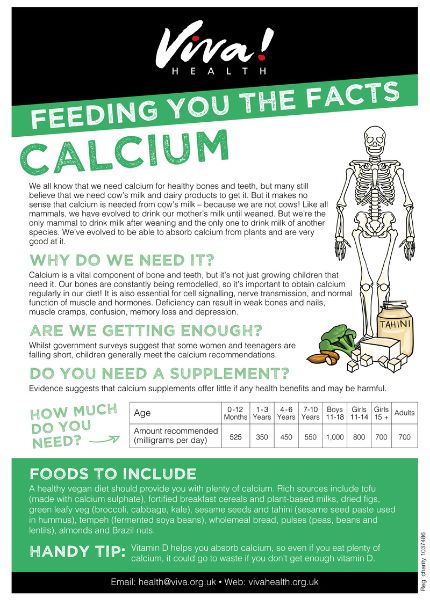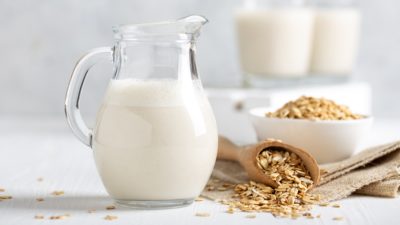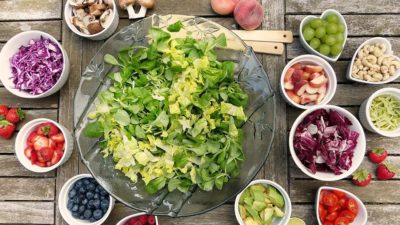Mini factsheet: Calcium and vitamin D

Are we getting enough?
Calcium
We all know that we need calcium for healthy bones and teeth, but many still believe that we need cow’s milk and dairy products to get it. But it makes no sense that calcium is needed from cow’s milk – because we are not cows! Like all mammals, we have evolved to drink our mother’s milk until weaned. But we’re the only mammal to drink milk after weaning and the only one to drink milk of another species. We’ve evolved to be able to absorb calcium from plants and are very good at it.
Why do we need it?
Calcium is a vital component of bone and teeth, but it’s not just growing children that need it. Our bones are constantly being remodelled, so it’s important to obtain calcium regularly in our diet. It is also essential for cell signalling, nerve transmission, and normal function of muscle and hormones. Deficiency can result in weak bones and nails, muscle cramps, confusion, memory loss and depression.
Are we getting enough?
Whilst government surveys suggest that some women and teenagers are falling short, children generally meet the calcium recommendations.
Do you need a supplement?
Evidence suggests that calcium supplements offer little if any health benefits and may be harmful.
How much do you need?
| Age | Amount recommended (milligrams per day) |
| 0-12 months | 525 |
| 1-3 years | 350 |
| 4-6 years | 450 |
| 7-10 years | 550 |
| Boys 11-18 | 1000 |
| Girls 11-14 | 800 |
| Girls 15+ | 700 |
| Adults | 700 |
Foods to include
A healthy vegan diet should provide you with plenty of calcium. Rich sources include tofu (made with calcium sulphate), fortified breakfast cereals and plant-based milks, dried figs, green leafy veg (broccoli, cabbage, kale), sesame seeds and tahini (sesame seed paste used in hummus), tempeh (fermented soya beans), wholemeal bread, pulses (peas, beans and lentils), almonds and Brazil nuts.
Handy tip
Vitamin D helps you absorb calcium, so even if you eat plenty of calcium, it could go to waste if you don’t get enough vitamin D.
Vitamin D
Vitamin D is often overlooked, and many people are unaware that deficiency is common in the UK, especially during the winter.
Why do we need it?
When we think bone health we think calcium, but vitamin D is just as important. Adequate intake prevents rickets (osteomalacia in adults), a rare bone disorder which results in softening and weakening of the bones, increasing the risk of fractures and bone deformities. Sufficient vitamin D intake is particularly important under the age of 18 when most of our bone mass is established.
Are we getting enough?
It’s estimated that 20 per cent of adolescents, adults and older people in the UK may be deficient in vitamin D and as much as 60 per cent may be defined as insufficient. Younger children tend to have higher levels. We get some vitamin D through our diet, but most is made in our skin in response to sunlight exposure. In the winter in the UK, sunlight doesn’t contain enough of the right type of ultraviolet rays for our skin to be able to make vitamin D.
How much do we need?
The government recommends 10 micrograms of vitamin D per day.
There are two types of vitamin D, D2 is always vegan but D3 (used in many breakfast cereals) is often extracted from sheep’s wool, so not suitable for vegans. However, some D3 is now produced from mushrooms and lichen – this is suitable for vegans.
The best plant sources include vitamin D-fortified plant-based milks, vegetable margarines and breakfast cereals (if labelled suitable for vegans) and ‘vitamin D mushrooms’ grown under UV light.
Do you need a supplement?
More likely not but it depends on your lifestyle. If you get enough sunshine during the summer, your vitamin D stores are likely to be sufficient to see you through the winter. If you do need a supplement, it may either be over the winter months only (October to March) or throughout the year if you cover up or stay indoors most of the time. When choosing a supplement, 10 micrograms (400 IU) per day is enough and you shouldn’t go above 25 micrograms (1,000 IU).
Handy tip
Vitamin D is a fat-soluble vitamin, so taking supplements with foods that contain fat (avocado or peanut butter) will help you absorb it better.
This post has been categorised in: All Print Materials, Mini factsheets







